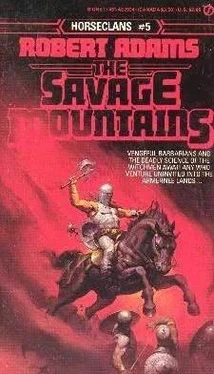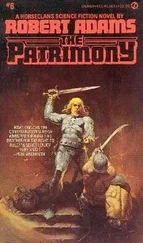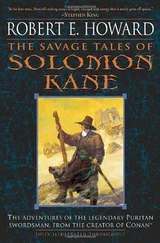The High Lord left his place to stride over and wring Hahfos’s hand, grinning merrily. “Of course you have my leave, Hahfos! And I wish you every happiness. Intermarriage has proven the only way to weld bonds between new lands and old. I had felt certain that some of the soldiers I’m going to leave to garrison this fort would wed Ahrmehnee girls, but that you, one of my best officers …” He suddenly smote fist in palm, exclaiming, “And I’ll gift you a wedding present, son Hahfos. You may have personal choice of the men who make up the two battalions I’m leaving here. You’ll command them, this fort and the stahn as Lord Warden of the Ahrmehnee Marches.”
Hahfos reeled on suddenly weak legs, feeling a little as if a warclub had smashed his helm. March wardens were nobles of the Third Rank, the peers of ahrkeethoheeksee, army marshals and lord councilors. He had never dreamed of aspiring so high!
“And,” the High Lord continued, “I’ll even give you the chit’s brideprice.”
Hahfos’s color deepened. “Please, mah lord, no, man … mah lord is too generous.”
“All right then,” chuckled the High Lord, “call it a loan. I’ll hold your house and effects at Goohm as security.”
The wedding of Kogh Taishyuhn to Zehpoor Frainyuhn was completed in less than a quarter-hour, but the festivities stretched on for more than a week—dancing and eating and dancing and guzzling and dancing and ritual mock combats and dancing and a few deadly-serious combats and dancing and pony racing and dancing and more gorging and guzzling, followed as a matter of course by more dancing. Over the long centuries, Milo had been exposed to many different peoples and cultures, but he could not recall another so obsessed with dancing. The village and the sprawl of camps surrounding it resounded by day and by night to the throbbings of Ahrmehnee drums, the wails of flutes and the rhythmic stampings and clappings and shouts of dancers and those who had stopped long enough to cram their mouths with food or drain off gourds of thick beer and tankards of wine.
Milo had thought it wise to keep most of his soldiers in the castra, bringing no more than a score of officers and men from each regiment. He still knew relatively little of the Ahrmehnee, but he knew his soldiery in great detail and had no wish to in any way endanger this unexpected godsend of final peace with the fierce mountaineers who had for so long plagued his border duchies. But as it turned out, most of the Confederation troops got to enjoy a bit of Ahrmehnee hospitality, since few of them—all hardened guzzlers and tough specimens in top physical condition—could take more than a full day of the “party,” many only half that time … or less. And Milo began to understand a little better the things which he had found hard to fathom in years past—how parties of middle-aged or even older raiders could hike units of pursuing Regulars into the ground, then suddenly turn and assault the exhausted troops with all the savage ferocity of a treecat.
As he drifted off into a much-needed sleep on one of those nights—his ears still assailed by the wild, rhythmic music, still seeing in his mind’s eye the bright bonfires and the circles of sinuously weaving women, the long lines of leaping, stamping, whirling warriors—he thought, “Hahfos and that Ahrmehnee girl will be a start. What a mixture that will be! Horseclans stock and Ehleen and now Ahrmehnee, and more than a few dashes of the Middle Kingdoms—in another hundred years, this Confederation should be home to an unbeatable race!”
Dr. Sternheimer had been admiring his fine new young body when his intercom buzzed. He strode quickly across his bedroom, reveling in the lack of those arthritic pains which his previous body had begun to develop, and depressed the button, looking up at the screen, but prudishly keeping his own nudity out of range of the video-camera.
“Doctor,” announced the caller, “the Armenian Expedition is back at the Broomtown Base. Dr. Braun is on the radio now. I… I think perhaps you had best speak with him yourself, doctor.”
Hurriedly, Sternheimer slipped into a coverall and zipped it while stepping into a pair of canvas shoes, left his suite and jogged down the hall to the lift, then changed his mind and took the stairs, three at a time. He arrived at the top of the seven flights sweating lightly, breathing normally and inordinately pleased at the overall fitness of this most recent body.
On the roof of the main tower, the shielding had been rolled back and a cool breeze with the tang of the sea brushed his face and ruffled his dark, wavy hair. As he began jogging toward the distant penthouse which was the communications center, the distant, booming roar of a bull alligator drew his gaze to the north.
Though the morning sun was already cresting the eastern horizon, its heat was not yet sufficient to dispel the misty fogs of the night, and, as far as the dark-brown eyes of Sternheimer’s latest body could see, the deadly swamps were covered in a billowy haze. The ocean of opaque whiteness was only marred by the upthrust tops of the taller trees—pine, cypress, swamp oak.
The bull boomed yet again. Closer to hand, a stooping eagle sank swiftly into the mists, then reemerged, broad wings beating for altitude. In its cruel claws some long animal writhed and jerked. Too short and broad, thought Sternheimer, to be a snake; most likely a large lizard then, or an immature crocodile. As he pressed his two thumbs to the identification plate of the door, he watched the avian hunter flap away westward with its catch. “Braun? Sternheimer, here. How was your trip?” The voice from the transmitter sounded weary unto death. “A bloody balls-up, David, from start to finish. Jay Corbett is dead, and Erica too, probably. Both my … this body’s legs are becoming gangrenous, and I’m going to have to make a transfer soon.”
“Were you able to get the devices out, Braun, and the precious metals?” Dr. Sternheimer snapped. He could not have cared less about his subordinate’s physical ills: bodies, after all, were expendable.
Braun sighed deeply. “Oh, we got them out of that volcanic valley, David—over a hundred packloads, in all.”
Sternheimer smiled broadly, admiring his expanse of even white teeth reflected up at him from the polished metal surface of the table. “What’s the total tonnage, Braun? One of the cargo copters is down for maintenance, but I can send the other two up and—”
Braun sighed once more. “That won’t be necessary, David. Those packloads and animals are scattered along two hundred miles of mountain trails, along with the corpses of the guards and packers.”
The smile quickly disappeared. When Sternheimer spoke again, his voice was cold and tight, tight as the clenched teeth behind the almost immobile lips. “You had better start at the beginning, Dr. Braun.”
“As you wish, David, as you wish. Corbett and I deduced that the volcano was on the verge of a major eruption, and he determined that if we could block the fissure that served it as a safety valve, we—”
“Yes, yes, I know all that, Braun. I approved it, remember?” Sternheimer found it difficult to keep the frustration and anger out of his voice.
“Well, David, we must have miscalculated somewhere along the line. The eruption was two days later and infinitely more violent than we had imagined it would be. We had forded the Catawba River and were skirting the northwestern flank of an odd rectangular plateau-making as rapid a progress as we could, since we were expecting a pursuit of some kind in the absence of an eruption—when a terrible earthquake occurred. We lost half the packtrain right there, David. A good half-mile of cliffs collapsed outward and buried them—men, mules, ponies, everything!
Читать дальше












